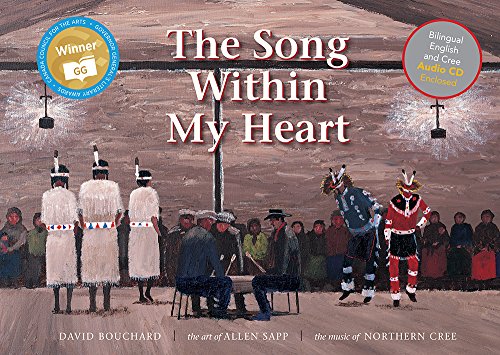-
Objects in Mirror
Tudor Robins
Paperback (Red Deer Press, May 31, 2013)Grace is looking forward to spending her summer weekends at horse shows riding new and spirited horse Sprite to the medal podium. But things don't always go as planned. It seems that her summer is ruined when Sprite is sold by the riding stable to a new owner. Other opportunities present themselves however - Grace is now going to live her dream. She will be spending all summer working with horses in her new job helping the trainers at the stables. With handsome new coworker Matt and a fragile, damaged mare that needs extra special care, Grace's summer seems perfect. She can't hide from the truth though - the eating disorder that she is starting to acknowledge but not truly understand is rearing its ugly head and threatens to derail everything. Will she be able to heal herself along with the horses she is caring for? R
R
-
The Queen's Feet
Sarah Ellis, Dusan Petricic
Hardcover (Red Deer Press, Jan. 9, 2006)Christie Harris Illustrated Children's Literature Prize (2007) nominee Canadian Children's Book Centre Our Choice, 2007 Shining Willow Award nominee, 2008 Queen Daisy can't help it - It's her feet that are misbehaving! Queen Daisy had a great deal of trouble with her feet. They had a mind of their own and did not like behaving in a royal way. Proper shoes were out of the question, and sometimes her feet did not wear shoes at all! Her feet were especially naughty when Queen Daisy forced them to dress properly. At balls her feet would kick high in the air or tap-dance on the marble palace floors. Once, when a king from a neighboring kingdom brought his mean, bullying ways to Queen Daisy's court, her feet hauled off and kicked the king in the ankle. That's when a meeting had to be called of all the wise women and wizards and footmen in the kingdom to find a solution to Queen Daisy's terrible problem. And what a solution it turns out to be. Queen Daisy's feet will dance into the hearts of restless feet everywhere. Sarah Ellis's wonderfully whimsical tale will ring a bell with all children and adults whose feet get restless. And Du_an Petricic illustrations may well encourage a little more unroyal behavior. L
L
-
Mosh Pit
Kristyn Dunnion
Paperback (Red Deer Press, April 1, 2005)Juliet meets her Juliets in this raw look at punk, young love and the sometimes cloudy road to adulthood. Mosh Pit, a compelling story of rebel girls in the modern city, stars Simone - torn between her loyalty to her rebellious heart - throb Cherry and her feelings for Carol, streetwise and distant enough to be alluring. This edgy young adult novel takes Simone through the modern equivalent of Hades where she gradually gains a sense of who she is and more importantly who she can be.
-
The Sakura Tree
Carolyn McTighe, Karen Brownlee
Hardcover (Red Deer Press, May 28, 2007)Three girls sent away by a father who wishes for them a more prosperous life. Once there lived three Japanese sisters: The eldest sister's name was Aki, which means autumn. She was named this because she was as graceful as the gold and red colored leaves that swirl gently to earth in the autumn breeze. The middle sister's name was Fuyu, which means winter. She was named this because her skin was as fair as the whitest winter's snow. The youngest sister's name was Haruko, which means spring. She was named this because her silky, black hair smelled of the sweetest spring blossoms. The gently eloquent tale follows the progress of three so-called "picture brides" who come to Canada in the early twentieth century, three girls sent away by a father who wishes for them a more prosperous life than he can provide in their hometown of Sendai. Reluctant as they are to leave home, the sisters are nonetheless obedient to their father's wishes. Each takes with her one item that will remind her of their home. One brings a kimono, another a violin, but the youngest, Haruko, brings three seeds of the sakura tree. The sisters arrive on the shores of British Columbia, where their husbands await. Each joins the husband to whom she has been promised, and each has her own way of remembering the family and country she has left behind. Haruko plants the sakura seeds, each of which grows into a cherry tree. One spring, the blossoms swirl away in the wind, and are carried to the doorsteps of the two other sisters. The blossoms remind the sisters of Haruko and their Japanese home. Following the blossoms, they find Haruko's home and the three are reunited under the sakura trees to remember their lives together. This is a book about the meaning of family and home and an exploration of Japanese culture in Canada. Alberta Children's/Young Adult Book of the Year Nominee, 2008 CCBC's Best Books for Kids & Teens, 2008 N
N
-
Into the Wasteland
Lesley Choyce
eBook (Red Deer Press, March 30, 2015)Dixon Carter wants to share his life manifesto. Don't worry — there won't be any violence. Dixon doesn't believe in violence. But Dixon is seeing things differently. He has gone off his meds — the drugs deaden him to the world. He is writing a daily journal from the point he stopped the meds. There are times he is angry with the world and everyone in it. But then there are the times where he can see all the beauty, just like the Romantic poets. His girlfriend Sylvia and best friend Zeke are trying to help him on his journey. But when the real world throws a tragic event in Dixon's path his struggles to save himself become darker and much more difficult and dangerous.
-
The Song Within My Heart
David Bouchard, Allen Sapp
eBook (Red Deer Press, June 1, 2018)Renowned Cree painter Allen Sapp's inspired and stunning artwork beautifully complements this sweet story of a young First Nations boy preparing for his first pow-wow. The young boy's Nokum—his beloved grandmother—guides him through the exciting day and watches over him as events unfold. David Bouchard's rhythmic and informative text is based on remembrances from Allen Sapp's childhood. Winner of the Governor General's Literacy Award, The Song Within My Heart is a beautifully crafted picture book that refects the wonders of life on a reserve, the importance of the pow-wow, and ultimately, the love between grandmother and grandson.
-
Swimmers
Amy Bright
eBook (Red Deer Press, June 1, 2015)17-year-old Hunter Ryan is making a long-dreaded return trip home. He takes a Greyhound bus bound for Victoria, British Columbia with his ex-girlfriend Lee and a 12-year-old named Poppy. There's a reason that Hunter left his parents, his friends, and his sister Bridget behind when he left for Alberta to live with his Aunt Lynne. Now Lee has come to bring him back because it's time for him to face the real reason that he ran away. Swimmers traces their journey home, revealing Hunter's past and the precarious, uncertain present in which he now finds himself.
-
What Happened to Serenity
PJ Sarah Collins
language (Red Deer Press, June 12, 2015)What if the world wasn't like what you were taught to believe? Would you want to know? Are the consequences of challenging authority worth it if they lead to the truth? Katherine lives in a "post-apocalyptic community" living in complete isolation. Her town is austere, run by utopians who have created a strict paternalistic order. Knowledge and the search for truth are not permitted. Katherine wants to find out what happened to Serenity, a little girl who has disappeared from the community, but when she breaks out, what she discovers is anything but what she expected. This haunting story about growing up and searching for truth will challenge young readers' notions about knowledge, the search for truth, and the fight for freedom.
-
The Living Beach: Life, Death and Politics where the Land Meets the Sea
Silver Cameron
Paperback (Red Deer Press, April 17, 2014)How do beaches function? Where do the waves come from, and why are they always parallel to the shore, no matter which way the shore faces? Where does sand come from, and why are some beaches grey, some white, some beige? What plants and animals live there, and how do they deal with this harsh, plastic environment? And what do beaches mean to humans? Arrivals and departures, invasions and migrations, the first contact between the explorers and the indigenous peoples - they all take place in that sandy zone where the sea meets the land. When a film actor walks alone on a beach, the viewer knows s/he is contemplating change or reacting to it. On the summer sands, bishops and judges and executives become children again, building structures which they know the sea will destroy. Silver Donald Cameron uses a study of the elements of the beach to build a case for the beach as an integrated, living entity in its own right, and a model for the unity of all things on Earth. More than a tour of the eastern and western shores of North America, Cameron's book leads his readers to an awakening of the processes of life around us. The author begins with the science of waves and sand, and gradually reveals the inter-relatedness of all the habitues of the beach. The final destination is an understanding of how all living things are woven together in the fabric of life and what that means for "the stewards of the Earth". He lives in Halifax.
-
Jeremy Stone
Lesley Choyce
eBook (Red Deer Press, March 30, 2015)Jeremy Stone, the new young adult novel from acclaimed author Lesley Choyce, is told in free verse format. After moving from a residential school to a new school in a new community, Jeremy, a First Nations teenage boy is trying to find out where he fits in the world. He soon meets Caitlan, an intense girl who tells him about another boy — a boyfriend of hers — who has committed suicide. Jeremy isn't sure whether he has much to offer Caitlan, given his own uncertainties, but he is solid and supportive towards his new friend. A lot of the support comes from Old Man, the spirit of Jeremy's dead grandfather, with whom he has frequent illuminating conversations. In fact, Jeremy has frequent contact with the spirit world — his grandfather, Jenson, the suicide, as well as a childhood friend of Jeremy's, Jimmy Falcon. Each of these spirits help Jeremy find his way through a quagmire of bullying and racial taunts toward a more stable future. In the end, Jeremy asserts himself by summoning his father who has gone to work in the oil patch but who his son wants to return home.
-
Mister Got to Go: The Cat That Wouldn't Leave
Lois Simmie, Cynthia Nugent
Hardcover (Red Deer Press, Jan. 14, 2003)On a dark and soggy night, a bedraggled cat finds its way into the ivy-covered Sylvia Hotel in Vancouver's fashionable West End. Before long, Mister Got To Go has become not only a fixture at the hotel but a valuable employee. K
K
-
Waiting for the Sun
Alison Lohans, Marilyn Mets, Peter Ledwon
Paperback (Red Deer Press, Dec. 11, 2006)Alison Lohans is the author of over 12 published books. Nine of these have appeared on the Canadian Children's Book Centre "Our Choice" List; two won Young Readers' Choice awards, and 10 have been short-listed for various other awards. Alison has recently been serving as Writer-in-Residence at Regina Public Library. She is active in numerous writing organizations, and also enjoys time with her family. Her favourite leisure activity is playing her cello. R
R